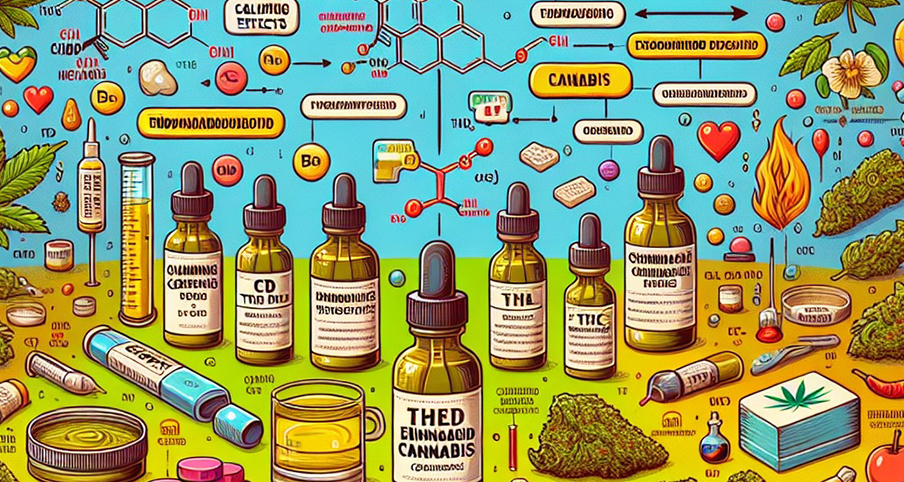Cannabidiol, commonly known as CBD, has become a focal point of interest in the health and wellness industry. Derived from the cannabis plant, it is often promoted for its potential therapeutic benefits. However, one of the most frequently asked questions is: Does CBD get you high? To answer this, we must explore the effects of CBD, its advantages and disadvantages, how it is absorbed by the body, and how it differs from THC (tetrahydrocannabinol).
Effects of CBD
CBD is a major cannabinoid found in cannabis plants, but unlike THC, it does not produce intoxicating effects. It interacts with the endocannabinoid system (ECS) in the human body, which plays a crucial role in regulating mood, pain, and immune responses. Rather than binding directly to cannabinoid receptors like THC, CBD influences these receptors indirectly, modulating their activity.
Therapeutic Potential
- Pain Relief: CBD is known for its potential to alleviate chronic pain by reducing inflammation and interacting with neurotransmitters.
- Anxiety and Depression: Research suggests that CBD may have anxiolytic and antidepressant effects, making it a natural alternative to pharmaceutical drugs for some individuals.
- Anti-Inflammatory Properties: Its ability to reduce inflammation makes CBD a candidate for treating conditions like arthritis and inflammatory skin diseases.
- Neuroprotection: CBD has shown promise in managing epilepsy and other neurological disorders, with the FDA approving Epidiolex for certain epilepsy forms.
Pros and Cons of CBD
Pros
- Non-Intoxicating: CBD provides potential therapeutic benefits without the psychoactive effects of THC, allowing for daily use without impairment.
- Versatile Applications: It can be used for a wide range of conditions, from mental health issues to physical ailments.
- Low Risk of Addiction: CBD is not addictive, making it a safer long-term option compared to some pharmaceuticals.
Cons
- Variable Efficacy: The effects of CBD can be inconsistent among different individuals, influenced by factors such as genetics and lifestyle.
- Potential Drug Interactions: CBD can interfere with the metabolism of certain medications, necessitating medical consultation for users on prescription drugs.
- Lack of Regulation: The CBD market is under-regulated, leading to variations in product quality and potency.
Forms of Absorption of CBD
CBD can be consumed in various forms, each offering different rates of absorption and onset times:
- Oils and Tinctures: These are taken sublingually (under the tongue) for rapid absorption directly into the bloodstream.
- Edibles: Products like gummies and capsules offer a convenient way to consume CBD, though they have a delayed onset due to gastrointestinal absorption.
- Topicals: Creams and lotions are applied to the skin, providing localized relief for conditions such as joint pain or skin disorders.
- Vaping: Inhalation through vaporizers allows for quick absorption into the bloodstream, offering rapid effects but with potential respiratory concerns.

Muha Meds 2 Gram Disposable Empty CBD Carts With Packaging Box
Discover the Muha Meds 2 gram disposable vape carts featuring a powerful ceramic coil and convenient design.
Does CBD Make the Body Excited?
CBD does not make the body “excited” in the way that stimulants or psychoactive substances do. Instead, it is often associated with a sense of calm and relaxation. Users typically report feeling more balanced and less stressed, without experiencing the euphoria or altered perception associated with THC. While CBD can contribute to improved mood and mental clarity, it does not provoke excitement or increased heart rate.
Difference Between CBD and THC
The primary difference between CBD and THC lies in their psychoactive properties. THC is the compound responsible for the “high” sensation associated with cannabis use. It binds directly to CB1 receptors in the brain, leading to altered sensory perceptions and mood changes. In contrast, CBD does not bind directly to these receptors and does not cause psychoactive effects. This makes CBD an appealing option for those seeking the therapeutic benefits of cannabis without the high.
Conclusion
CBD does not get you high, setting it apart from THC and making it a favorable alternative for those seeking therapeutic benefits without psychoactive effects. While it offers numerous potential health benefits, including pain relief and reduced anxiety, it also comes with considerations such as variable efficacy and potential drug interactions. Understanding how CBD is absorbed and how it differs from THC can help users make informed decisions about incorporating it into their wellness routines. As research continues to expand, CBD’s role in health and wellness is likely to grow, offering more insights into its full potential.


